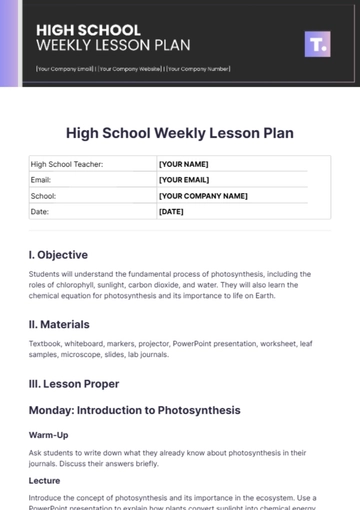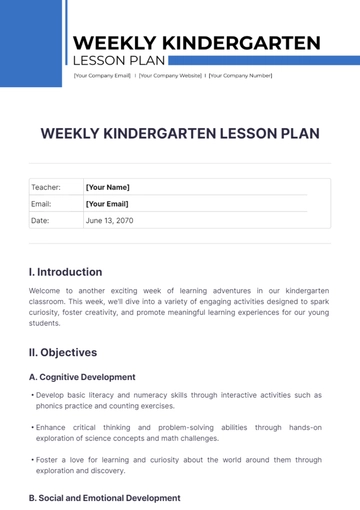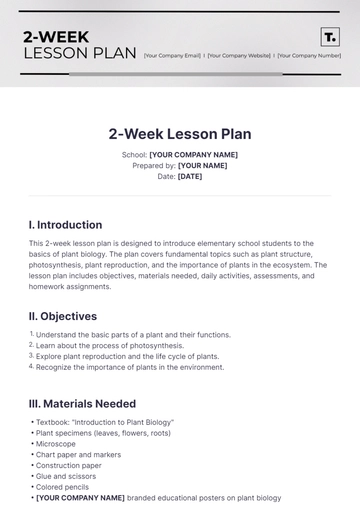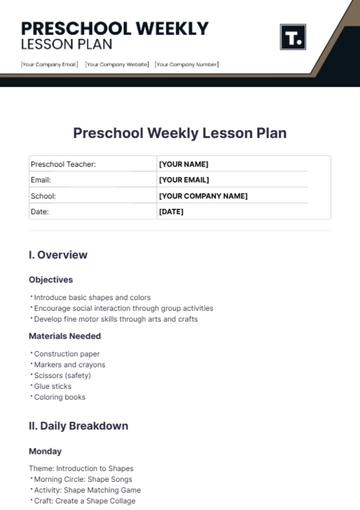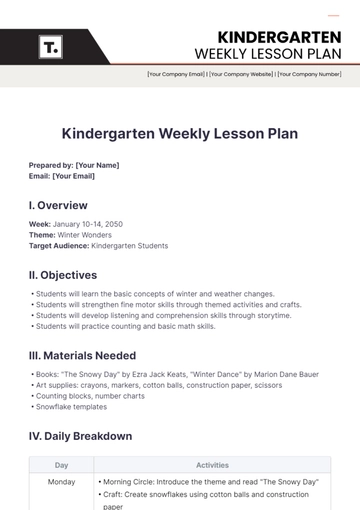Free High School Weekly Lesson Plan
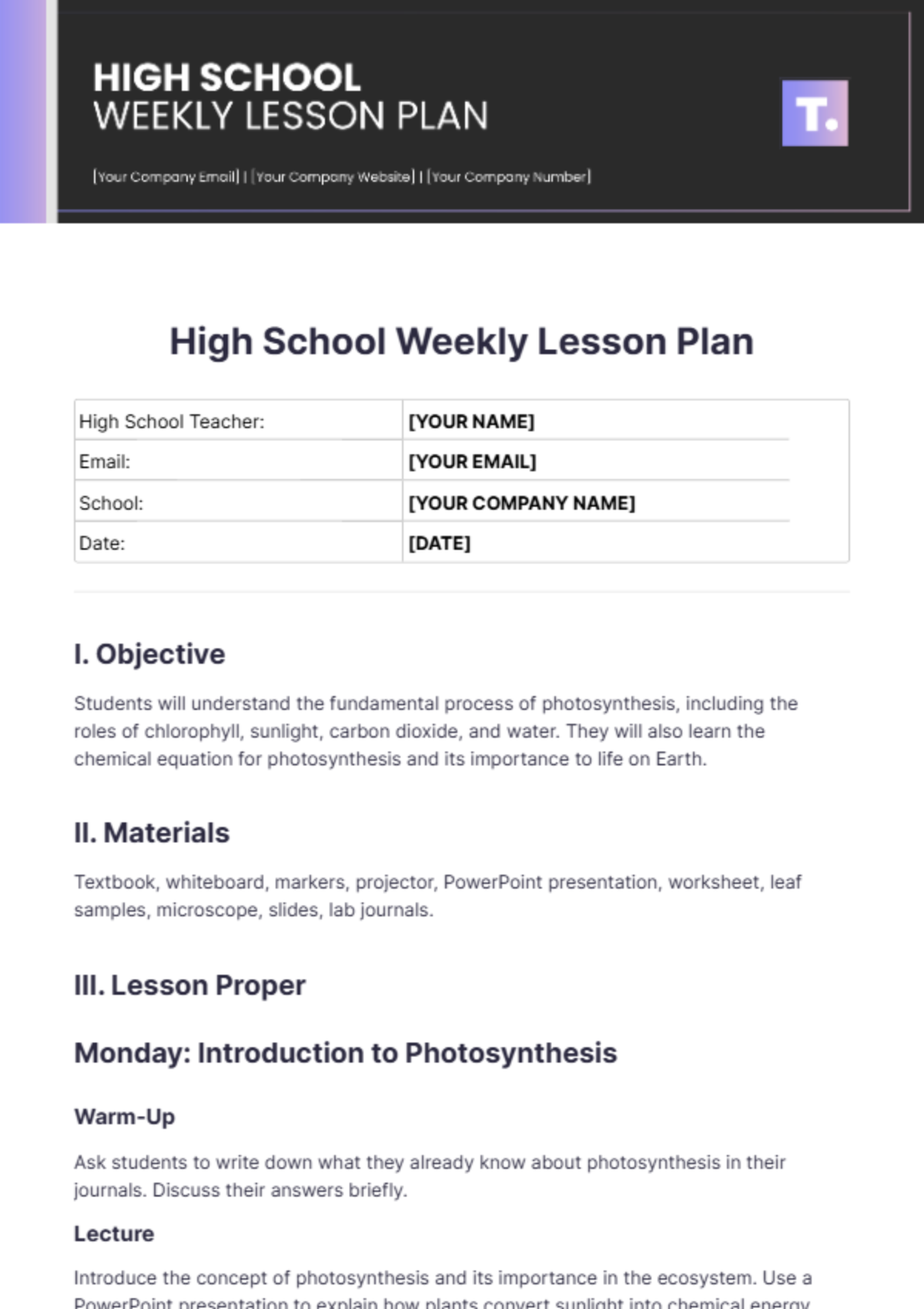
High School Teacher: | [YOUR NAME] |
Email: | [YOUR EMAIL] |
School: | [YOUR COMPANY NAME] |
Date: | [DATE] |
I. Objective
Students will understand the fundamental process of photosynthesis, including the roles of chlorophyll, sunlight, carbon dioxide, and water. They will also learn the chemical equation for photosynthesis and its importance to life on Earth.
II. Materials
Textbook, whiteboard, markers, projector, PowerPoint presentation, worksheet, leaf samples, microscope, slides, lab journals.
III. Lesson Proper
Monday: Introduction to Photosynthesis
Warm-Up
Ask students to write down what they already know about photosynthesis in their journals. Discuss their answers briefly.
Lecture
Introduce the concept of photosynthesis and its importance in the ecosystem. Use a PowerPoint presentation to explain how plants convert sunlight into chemical energy.
Activity
Show a video about photosynthesis. Have students take notes and discuss the video in pairs.
Tuesday: The Photosynthesis Equation
Warm-Up
Review the key points from Monday's lesson. Discuss any questions students may have.
Lecture
Introduce the chemical equation for photosynthesis: 6CO₂ + 6H₂O + light energy → C₆H₁₂O₆ + 6O₂. Explain each component of the equation.
Activity
Provide a handout with the photosynthesis equation and ask students to label the reactants and products. Facilitate a class discussion on the importance of each component.
Wednesday: The Role of Chlorophyll
Warm-Up
Show different leaf samples and ask students to observe their colors.
Lecture
Explain the role of chlorophyll in photosynthesis and why plants are green. Discuss the light spectrum and the absorption of light by chlorophyll.
Activity
Have students examine leaf samples under the microscope and identify the chloroplasts. Record observations in their lab journals.
Thursday: The Light-Dependent Reactions
Warm-Up
Review the previous day's lesson on chlorophyll. Ask students to summarize what they learned.
Lecture
Introduce the light-dependent reactions in photosynthesis. Describe the process and its location in the chloroplasts.
Activity
Assign students to small groups to create a poster illustrating the light-dependent reactions. Each group will present their poster to the class.
Friday: The Calvin Cycle
Warm-Up
Review the light-dependent reactions. Ask students how energy from sunlight is being used.
Lecture
Introduce the Calvin Cycle, including its stages and significance in producing glucose. Explain how it uses the products of the light-dependent reactions.
Activity
Provide a worksheet with diagrams of the Calvin Cycle. Ask students to fill in the missing details and answer related questions.
IV. Assessment
At the end of the week, students will take a quiz on photosynthesis covering key concepts, the chemical equation, the role of chlorophyll, and the stages of photosynthesis.
V. Homework
Throughout the week, students will complete daily homework assignments that reinforce the day's lesson. These may include reading textbook sections, answering reflection questions, and completing related worksheets.
VI. Extensions
For advanced students, provide an optional research project on the impact of environmental factors (such as light intensity, carbon dioxide levels, and water availability) on the rate of photosynthesis.
VII. Modifications
For students with learning difficulties, provide simplified notes and visual aids. Offer additional one-on-one guidance and allow extra time for completing activities.
VIII. Closing
Summarize the key points of the week's lessons. Encourage students to reflect on how photosynthesis is essential to life on Earth and its broader implications in ecosystems and human life.
- 100% Customizable, free editor
- Access 1 Million+ Templates, photo’s & graphics
- Download or share as a template
- Click and replace photos, graphics, text, backgrounds
- Resize, crop, AI write & more
- Access advanced editor
Elevate high school lesson planning with Template.net's dynamic Weekly Lesson Plan Template. Crafted for educators, this resource is more than just a document; it's a tool for seamless organization. With its editable and customizable features, teachers can tailor each week's schedule effortlessly. Empowered by an AI Editable Tool, efficiency and flexibility redefine the classroom experience.
